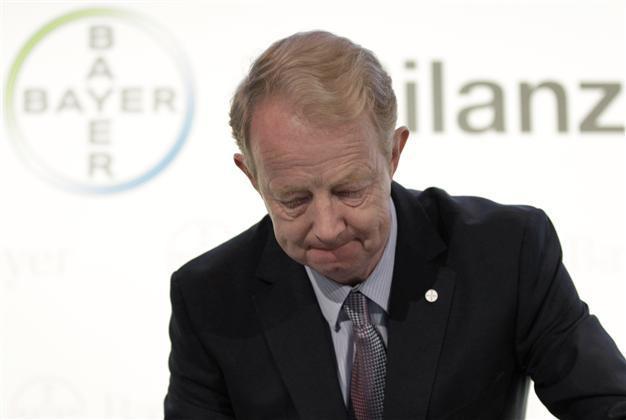Bayer mulls challenge to India cancer drug ruling
NEW DELHI - Agence France-Presse

Marijn Dekkers, CEO of German chemical giant Bayer AG. AP photo
Bayer AG said Tuesday it was mulling ways to challenge a ground-breaking Indian ruling allowing a local firm to produce a vastly cheaper copy of a cancer drug made by the German pharmaceutical giant.
The ruling on Monday by India's controller general of patents marked the first time a so-called "compulsory licence" for production of a patented drug has been granted in India, known as a global generics drug powerhouse.
"We will evaluate our (legal) options to further defend our intellectual property rights in India," Bayer spokesman Aloke Pradhan told AFP, saying the company was "disappointed by the decision." Under the ruling, closely watched by global drugmakers, Bayer must give a licence for cancer drug Nexavar to Indian company Natco Pharma.
Natco will pay Bayer a six percent royalty on net sales of the drug and sell the medicine for 8,800 rupees ($175) a month.
That sum represents a 97 percent reduction on the 280,000 rupees price that Bayer charges in India for a monthly dose of the drug, which is used to extend the lives of patients suffering from advanced kidney and liver cancers.
Indian patent controller P.H. Kurian granted the right to Natco to produce the drug after concluding Bayer had priced the drug "exorbitantly," making it "out of reach" of most Indian patients.
The decision could pave the way for a rush of other "compulsory licence" applications in India and potentially in other poor nations, allowing access to patented life-saving drugs at a fraction of the cost, patient groups said.
Under the World Trade Organization's TRIPS Agreement, which governs trade and intellectual property rules, compulsory licences are a legally recognised means to overcome barriers in accessing affordable medicines.
The decision "serves as a warning that when drug companies are price gouging and limiting availability, there is a consequence," said Michelle Childs, a policy director at Medecins Sans Frontieres (Doctors Without Borders).
"The Patent Office can and will end monopoly powers to ensure access to important medicines," she said.
India, known as the "pharmacy to the developing world," has long been a key provider of cheap generic medicines as it did not issue drug patents until 2005, when it was obliged to adhere to WTO intellectual property regulations.
